 Image courtesy of Jennifer Lyn Morone™ Inc
Image courtesy of Jennifer Lyn Morone™ Inc
Jennifer Lyn Morone has turned herself into a corporation and collection of marketable goods and services. Everything she is biologically and intellectually, everything she does, learns or creates has the potential to be turned into profits. Jennifer Lyn Morone™ Inc is a graduation project in Design Interactions but as Jennifer underlines, this is not a speculative project.
JLM Inc is a new business established to determine the value of an individual. The corporation derives value from three sources and legally protects and bestows rights upon the total output of Jennifer Lyn Morone:
1. Past experiences and present capabilities. These are offered as biological, physical and mental services such as genes, labour, creativity, blood, sweat and tears.
2. Selling future potential in the form of shares.
3. Accumulation, categorisation and evaluation of data that is generated as a result of Jennifer Lyn Morone’s life.
JLM Inc is not only an audacious long term performance, it is also an thought-provoking exploration into personal data exploitation by corporations and governments. The projects is an extreme form of capitalism which might ironically enable an individual to regain some ownership of and power over their own data. Jennifer Lyn Morone Inc is obviously a very personal venture but the designer is also beta testing on herself an app, the Database of ME or DOME, that will ensure that your identity and data can be collected and stored for you and only you.
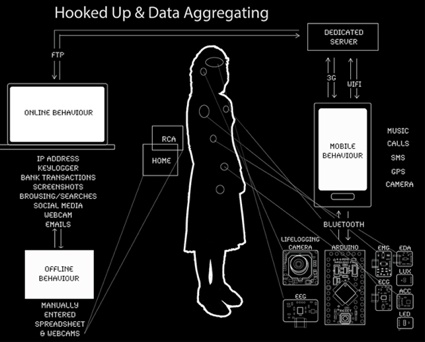 Image courtesy of Jennifer Lyn Morone™ Inc
Image courtesy of Jennifer Lyn Morone™ Inc
Jennifer Lyn Morone, Inc. Video of the project. Film: director- Ilona Gaynor
A few questions (amongst the dozens i wanted to ask) to Jennifer:
Hi Jennifer! I obviously laughed when i read the sentence ‘This is not a Speculative Project’ in the gallery. So you really managed to become an Incorporated Person? How did you do that? Is this a standard, banal process?
It’s nice to know that the sign worked as it was intended. I feel that there’s a limit to the impact that speculative work can have as it can’t be directly compared to a current reality. This was my way of addressing the audience just to make it clear that the project is real and actively negotiating several problems that we are faced with today and that need to be addressed.
So, yes, I really have become an Incorporated Person. The process has not been standard or banal at all but that’s probably because I am not in business school setting up a business to sell something. Rather, I was on a critical design course reappropriating capitalist and corporate strategy to make being a person a business.
In November 2013 I starting looking into the details to incorporate, which seemed deceptively simple: choose the business name; decide what kind legal entity you want your business to be (I became a C-corporation); figure out where to incorporate (I did it in Delaware); find a registered agent; fill out some forms; and then pay. All of this, however, required a significant amount of research for me to even understand what the legal and financial implications of my decisions would be. For example: what being a C-corp versus an S-corp entails, how valuation of companies works, what are the benefits to incorporating in Delaware compared to other States, how shares work and how the price per share is determined (which I find completely illogical).
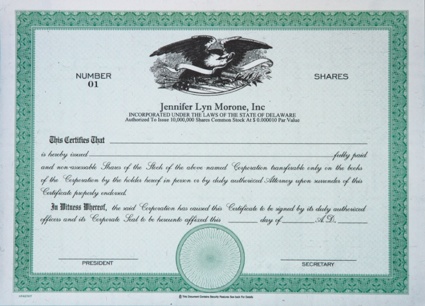 #01 Share Certificate of Jennifer Lyn Morone, Inc, a Delaware Corporation. Image courtesy of Jennifer Lyn Morone™ Inc
#01 Share Certificate of Jennifer Lyn Morone, Inc, a Delaware Corporation. Image courtesy of Jennifer Lyn Morone™ Inc
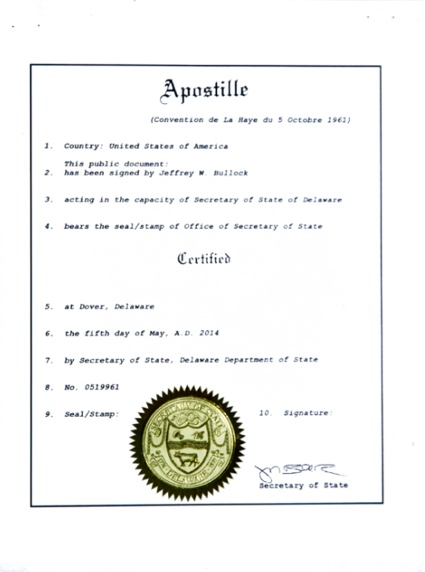 Delaware Apostille Certificate. Image courtesy of Jennifer Lyn Morone™ Inc
Delaware Apostille Certificate. Image courtesy of Jennifer Lyn Morone™ Inc
I used the research, combined it with my intention and fused it into a business plan where I had to define what my mission is, what I stand for, and what my vision is and how I plan to achieve these by being the business (person) I will be. Repurposing the corporate mentality even further required me to stop thinking like an individual about what I want and need but what other people want and what can I offer to meet their needs. This helped me to determine my services.
What I found interesting is that it is quite common for people to incorporate before they even know what they want to do. They can do this because, in Delaware where the majority of major corporations are located, all you need to state in the articles is that “The purpose of the corporation is to engage in any lawful activity for which corporations may be organized under the General Corporation Law of Delaware”. This is also the common way of describing what the company will do so as not to limit the ways in which it can make money.
Now that I have incorporated myself, I have legally created another person with my name in the eyes of the law. In the USA my corporate self now has not only the same but even more rights and benefits than I do as an individual. My corporate self takes on any responsibility and I am not liable for its actions or debt, only my initial investments. This is why we see companies able to go bankrupt, get bailouts or get away with ruthlessness without anyone being charged or responsible for what happens.
As the founder of my corporation I turn over my skills, capital, possessions and intellectual property to it and these become its assets and increase its value. My identity (name, appearance and IP addresses) become the brand and are trademarked; my mental abilities (knowledge) as processes and strategies; my physical abilities as equipment; my biological functions as products, my data is the corporations property and the shares are my potential. These all become assets that I can now capitalise on. My debt is turned into the corporations liability, which actually increases the company’s value if it were to be sold.
By issuing shares I can raise capital, based purely on my potential success. In exchange the shareholder has partial ownership of my corporation. I wanted to do this to expose that shares in no way reflect the true value of a company, only its perceived value based on popularity and that stock markets are pure gambling.
As the founder I can set the price of the shares extremely low, the usual amount advised in 10,000,000 shares at $0.001 or $0.0001 per share, I opted for the latter. After that I applied for a tax number (EIN), which takes about an hour to receive. Then you have to set up a bank account after which you can buy your shares, usually at least a third of the shares, and reserve about 10-15% for stock equity to pay for any services needed. Then you look at what the corporation’s assets are, what’s your inventory, and include the work that has gone in so far and put a number to it. A valuation has to be done to then determine what the new price per share will be and this can be done by someone who is an experienced investor or a venture capitalist, but they basically just take that number that you have got and multiply it by 10 and then divide that by the number of shares.
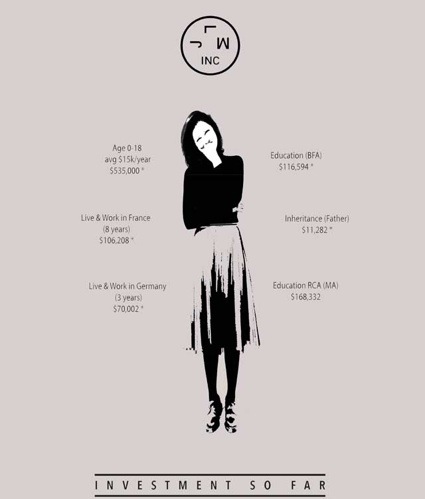 Image courtesy of Jennifer Lyn Morone™ Inc
Image courtesy of Jennifer Lyn Morone™ Inc
How do you put value on things such as Education RCA and Live and work in Germany? And why is living and working in Germany proportionally more valuable than living and working in France?
Those prices actually have no reflection of how valuable the experiences have been. What the numbers represent are of what my life has cost so far divided up into periods of time based and how much I either earned or what was paid for me to live and learn. These become my base values, the initial investment, on top of which I can begin adding the intangible (knowledge, personality, skills which are very hard to put a price on) I gained from these experiences and tangible assets (possessions/inventory, both internally – i.e. blood and externally – i.e. computer) that I acquired or continually produce. This gives me a starting point to know what my production costs are so I can determine an honest price for my services.
The cost of my education, how much I received after my father passed and how much I earned in France and Germany (to answer your question: France was significantly less since I worked for an ex-partner and didn’t receive a salary but also didn’t pay rent) I knew already. What I didn’t know and never thought to ask before was how much I cost my parents, purely financially, from conception to the age of 18. I asked my mother and she came back to me with this number with inflation figured in. I’ve since set aside shares for her.
It is an interesting perspective to now have. Often we think about what we don’t have or aren’t receiving. By calculating how much money has gone into my existence as input I then took a look at what my output has been, what I’ve actually done with that, and I wasn’t terribly impressed. In capitalism individuals are meant to consume as much input as possible, while corporations can’t survive unless their output is both useful and greater than their input, which needs to be relevant and not wasteful of time or money.
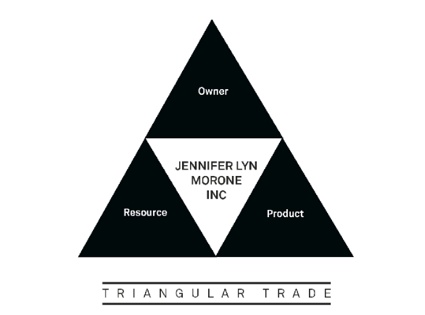 Image courtesy of Jennifer Lyn Morone™ Inc
Image courtesy of Jennifer Lyn Morone™ Inc
Could you explain us the purpose of the DOME app? How does it insure that your own information remains your property?
The philosopher John Locke stated that a person’s natural and inalienable rights are “life, liberty, and property”: that “everyone is entitled to live once they are created”, that “everyone is entitled to do anything they want to so long as it doesn’t conflict with the first right” and that “everyone is entitled to own all they create or gain so long as it doesn’t conflict with the first two rights”. Today, I believe that the data a person creates should be considered their property: it has a monetary value in the economic system that our lives are structured around. So I see data as a resource that people create and that is currently being exploited.
Governments were created to protect people and their rights but as we are living in a time of crony capitalism, where economic success is dependent on close relationships between business people and government officials, I think it will be a long time before any policy or solutions will be established. Instead what we are seeing are efforts made to better track and monitor our actions to get a clearer picture of how to better target our consumptive behaviour. This is what I consider data slavery.
Right now, as a hyper-connected network society, each person creates a trail of data that is being used and profited on mostly for advertising purposes. People are now referred to as consumers and statistics and government and Industry pay substantial sums for our information.
So as a form of protest and in an effort to revolt against this, I am using subversive tactics to reclaim what I feel should be a person’s rights by incorporating my identity and creating DOME (Database of Me) as a way to take ownership and control of my property. Now that I am a corporation any data that I create that is linked to my name, IP address and appearance is copyrighted or trademarked and therefore subject to litigation if used without my permission…think of how Getty gets the rights to images and if you use it without their permission or having paid you get a fine. So any photo I take, any email I write, any call, text, web search, cctv footage of me that is stored on someone else’s, company’s or government’s sever does not have the right to be there or to be used, sold, leased or traded.
DOME’s function, in its simplest form, is an app that acts as a firewall between you and other servers. You use all of the same services, apps and interfaces you do today but you also have your own server and the app operates quietly in the background of any device you use, making two copies of the data you transmit. One hard copy goes to your database, the other is encrypted and goes to its intended destination but can’t be used beyond that. In DOME’s complete form it is a customisable app that still does what the simpler form does but with its own applications so that a person can communicate, share photos, socialise, navigate, search for information, and record external sensors such as biosignals. So people would need to have their own server or a data locker on a shared server and download the app on their computers and phones.
For the purpose of this project all of my personal data collected with DOME is being displayed on the tracking page. This is to show and make a clear distinction that there are real lives behind the data, which is something that I think is critically missed in this data discussion. Right now there is only a portion of my information compared to what will eventually be there. It will being streamed in real-time to mimic how the NSA, GCHQ, Google, and others view our information now and it is public because I want to draw attention to how exposed we currently are.
I am also using it to measure my “operations” to monitor and track productivity and efficiency in the same way that corporations normally do. Spy software and keyloggers are becoming very commonplace mostly used by companies on their employees, jealous partners to their loved ones and parents to their children.
Currently, I am the first and only beta tester. I am using myself as the case study to capture as much data about myself as possible, store it all in one place to see how much a person can actually generate, and then correlate it to see which combinations are valuable.
Given the growing market for information if people have ownership and control of their data they should be the ones compensated for it, not other companies. So beyond any success with DOME I have the intention to build a Platform, or try to work with others who are heading in this direction as well, as a cooperative Data Broker. People would use DOME and have an overview of their information as a data portfolio from which they could choose, if they want, to send as packaged data sets to the Platform as an investment for a known purpose. The Platform would then combine different people’s information, as this increases the value of the data, and then sell it to the approved markets. Those that contribute their information would then get a return on their investment. This is not necessarily the best solution, it is only a fairer alternative to the system that is in place now.
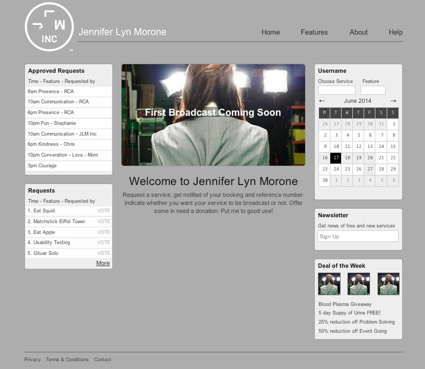 Image courtesy of Jennifer Lyn Morone™ Inc
Image courtesy of Jennifer Lyn Morone™ Inc
![]() Image courtesy of Jennifer Lyn Morone™ Inc
Image courtesy of Jennifer Lyn Morone™ Inc
Do you think that an individual has more to lose or more to gain from this extension of capitalism to their own person? Because on the one hand, they regain some power. On the other hand, the idea seems a bit perverse.
What I am doing is quite outside the realm of ordinary behaviour but we are made to behave in what I consider quite a perverse way because of the economic system in place. Which I am in awe of as it is not really what I would have expected after millennia of evolution.
But here we are and it is obvious that Capitalism works best for Capitalists. So, I am experimenting, with myself as the subject, to push the limits to the extreme to provoke change. The way in which I am doing it is merely reflecting how things are and where they seem to be heading. Systems and governments have been adjusted and overthrown before, the problem with this one is that it works too well for the ones running it but not well enough for the rest…and the disparity is growing wider.
Theoretically, I think a person would have more to gain as a corporation as long as capitalism is in place. In practice you might have to ask me that in a year, five or even 10 years time. People change, adapt, and continue to learn throughout their lives which is much more sustainable and scalable than the way companies operate. Together we are very diverse and alone unique because of the experiences we go through which create our most valuable asset, our individual perspectives. We all have assets and potential, but for many only a small percentage is even used and rarely for one’s own benefit. If my friends and family became corporations I know exactly who I would use and for what and I know who I would invest in, not only because of what they can do but because of who they are.
If people were to write a business plan like I did they would most likely benefit in some way and definitely gain a greater perspective. But unless they take on the legal and financial implications like I have they won’t truly change the way they live and how they engage with others. Technically speaking, all becoming a corporation really comes down to is looking at what you do and what you want to do and applying the same terminology, strategy and framework that corporations use to make money. I think that there will always be perversion as long we need to gain or earn money, or some form of currency, to meet our basic needs.
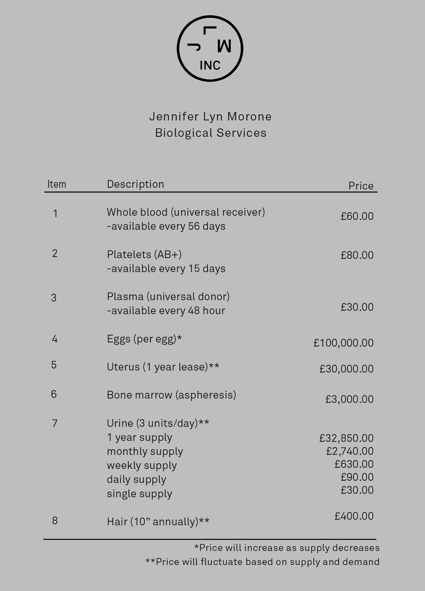 Image courtesy of Jennifer Lyn Morone™ Inc
Image courtesy of Jennifer Lyn Morone™ Inc
Could you describe to us the kind of services you are offering for free or those you are offering in exchange of money?
It really depends on who is asking and what they are asking for and is also affected by supply and demand. My services are categorised under mental, physical or biological, under which are combinations of features such as problem solving, compassion, strength, coordination, heat, and bodily functions. So when I offer something for free it’s because I produce it anyway and have no use for it myself and there is no demand, so it’s waste. If there starts to be a demand then it’s no longer waste but a byproduct which I can sell. If there’s something that is going to require depleting a resource, which would be measured by time, money and energy spent, in order to do it; such as consoling a friend and trying to help him through his problems for a few hours, then it will either be an exchange or invoiced. For example if this friend who often asks to meet to talk about his relationship problems is also there for me when I need consoling or help then it’s an exchange. But if he is never there for me when I need it, then I would send him an invoice.
Another example compared to how we are used to working now would be if a firm or company wants me for some mental services, say creativity and knowledge, then it would be similar to acquiring a consultant, but I would calculate my price based on what the knowledge cost to produce (education and experience) and calculate in my overhead costs, what I lost in time and energy against what I may have gained in value such as enjoyment or if I learned something new. If I there was value I gained I would deduct that from the price.
This may seem ridiculous but in an extreme form of capitalism each person would need to have a complete way to measure the value of their life and the quality of their knowledge, skills, health and relationships to increase efficiency.
Oh! i just saw you’re offering free urine! Is it ironic or would the urine be of any use to the buyer?
It’s both! There’s irony in the whole project, I’ve just dealt with it very pragmatically. We are bound to our bodies, some ways it’s an extension of our mind, in other ways it operates without us even having to think about it, in either case you are in it for as long as you live, or as long as it keeps up. It is 100% yours but there are external factors such as laws and taboos that condition you to use your bodies and the valuable things they do in very specific and deemed acceptable ways. Companies on the other hand don’t work this way. As I described above in how a waste might turn into a profitable byproduct, it depends on supply and demand.
So if you look at the body as equipment with quite mechanical operations, it produces things like urine systematically. As I am just starting I don’t have any customers. So I am copying how businesses give free promotions to attract potential buyers. In my research I came across people that were looking to buy urine for drug tests. There is also the potential to sell to labs of companies that are developing bio-fuel cells to power phones. Who knows who else might want it.
As there’s a pretty steady supply, which can be increased to an extent, if there started to be a demand that was more than I could supply then I could increase the price. If the demand is equal to the supply then I would price it based on what I saw people would pay and keep it competitive to bottled synthetic urine, yes there is such a thing. I could also increase my profit margin by only drinking tap water.
So, there’s irony on several levels: to illustrate the exploitative aspect of capitalism on resources and what this looks like at the extreme level of and by the individual; the ways in which we are conditioned to use our bodies and what we are ‘allowed’ to do with them; and the fact that you can potentially sell anything as long as there’s a willing buyer.
There is also another level of sincerity, in that the more manual your work is the less you are paid. When times are really tough, women in particular have had to resort to selling their bodies for money, with sex, pulling teeth, hair. I saw many people online looking to sell their kidney to help a friend in financial need. I also went to start a clinical drug trial and found that there are many healthy and educated young people who are now doing this for additional income. In face of an increasingly specialised workforce and automation of manual jobs people have to be resourceful and will have to look at what they have and what they can offer to live from.
Do you have a marketing plan that will ensure that people are eager to get those services and that you will make a profit rapidly?
I do have a marketing strategy as it was part of the business plan. My initial customers or users of my services will be everyone I engage with and know now. For example, if you wanted to interview me after the launch you would have to go through my website, check my calendar and block my time with the type service you want. You can then check my progress with the tracking page to make sure I’m doing what you asked of me. It would probably be an exchange as you are promoting me and helping me reach a wider audience, which would increase the value of me as a company and therefore effect my share price, creating profit for the shareholders.
My shares will be vested over 3 years, which means that I can’t sell them and I will not pay dividends until all production and overhead costs are covered. Until then all the money that comes in will be reinvested into the company until it is stable and making a profit.
My website will be monetised on the use and tracking page with banner ads to click on displaying things I own and want to sell, services I’m promoting and other people’s services. That will be similar to the way Google AdSense works with affiliate marketing but instead of products and companies it will be with people I know are looking for work or have just done something that’s available to the public, such as an exhibition or a book.
I plan to create some revenue also from endorsements to promote events I might attend, clothes I might wear, restaurants I might eat at and products I might use. This is to reflect how celebrities and athletes are used to influence the public and how product placement only happens when it has been paid to be seen. However, as normal people, we actually buy things and become walking billboards if logos or the brand’s identity are obvious.
Finally, there is the profitable but time consuming endeavor of pursuing intellectual property infringements. The profit of this will depend on whether my lawyer will charge me fees or if he will take a percentage from cases won.
 Stills from the video. Image courtesy of Jennifer Lyn Morone
Stills from the video. Image courtesy of Jennifer Lyn Morone
In the video you present yourself dressed as a businessman. Why not highlight the fact that you’re a woman?
This project takes its stance in criticism to the capitalist system of which I can not think of a more iconic image than the man’s business suit. When you see a man in a business suit you know his job is to make money. I wanted to highlight that I am reappropriating the Capitalist’s role and strategy by embodying this uniform. There is a very schizophrenic nature to this project and through it I must play many different roles and not all of them will fit. The clips in the back are used to represent this and indicate that I am making this role fit me and not the other way around.
I think that it is still obvious in the video that I am a woman. If I had accentuated this fact by dressing up in a female business outfit or a sexy dress then I still would still be playing a role. Actually, over the course of this project so far the fact that I am a woman has already come in the way a few times and with people I considered friends. One wanted to help with contextualising the philosophical nature of the project. Our communications became muddy because he developed feelings, which was uncomfortable to say the least. Then he became greedy after speaking with people about the project and aggressively stated that he deserved a large proportion of shares. And finally, he was dishonest about how he used money I gave him to set up the my server. The second set-back, which was directly because I am a woman, was with a friend that I pitched to as a potential investor, since he’s squandering lots of money to build a spaceship so he can go to the moon in a few years. At first he was very interested, up until the point that he realised I was not going to sleep with him.
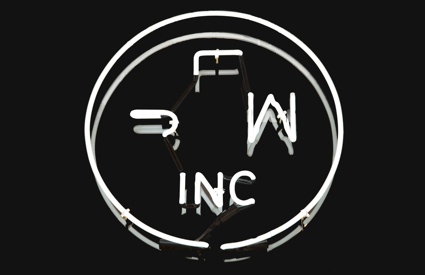 JML Neon. Image courtesy of Jennifer Lyn Morone™ Inc
JML Neon. Image courtesy of Jennifer Lyn Morone™ Inc
It looks to me like the project has just begun and you are going to learn and experience a lot in the coming months. Or will JML Inc disappear beyond the graduation show?
Do you have any plan to push the project further?
Yes, this project has just begun and there is so much work still to be done before launching. Over the summer I will be at Innovation RCA‘s launchpad where I will have a business mentor and work more on the marketing plan. I will also be holding a crowdfunding campaign for DOME and will soon do a friends and family round of shareholders for JLM Inc.
I am looking forward to many aspects of the project such as exposing the loopholes that big corporations use to their benefit and challenging norms that we are conditioned to. I have already learned many things and gained a greater understanding of our economic system, which brings a clarity to why our society and culture are as they are.
This project has the potential to go on indefinitely as I am using my life as the subject. And just as life goes, it’s hard to say what the outcome will be.
Thanks Jennifer!
Check out Jennifer Lyn Morone™ Inc at the RCA Show 2014 (Kensington) until 29 June.
Also part of the show: We have the means to make you happy.
Film: director- Ilona Gaynor
Editing: Ilona Gaynor
Grip: Naama Schendar, Rodrigo Lebrun, Rachel Knoll.
Subtitles: Rodrigo Lebrun
DOME app: Zac Tolley, Lloyd Elliot, Yosuke Ushigome
Website: Mark Osborne, Neil Thomson
Backend: Zwitterion’s Domain pty.
Electronics: Mike Vanis
